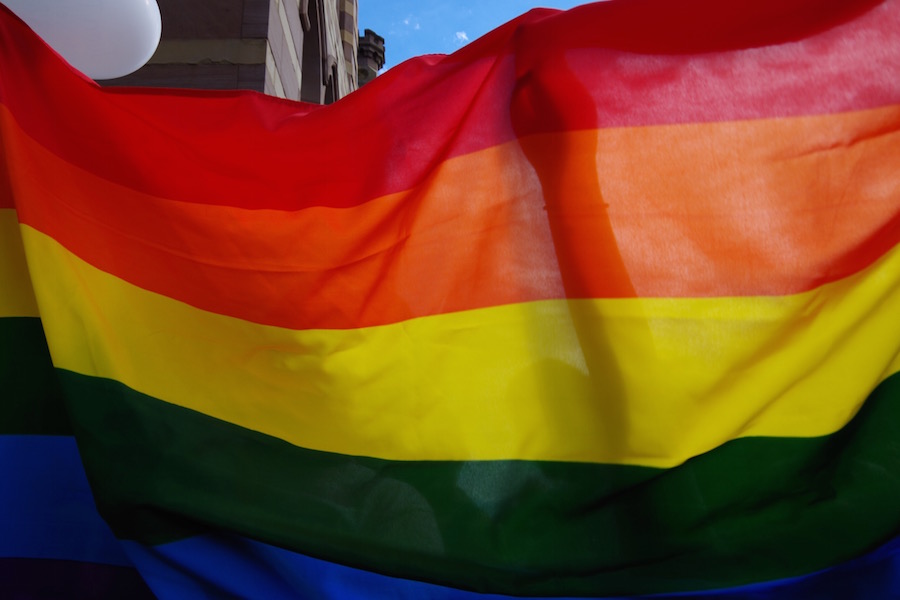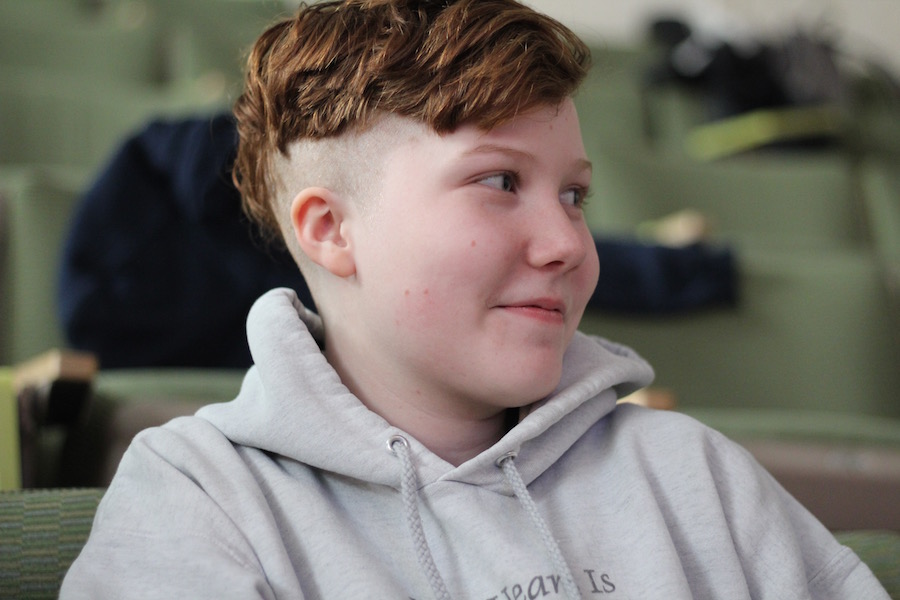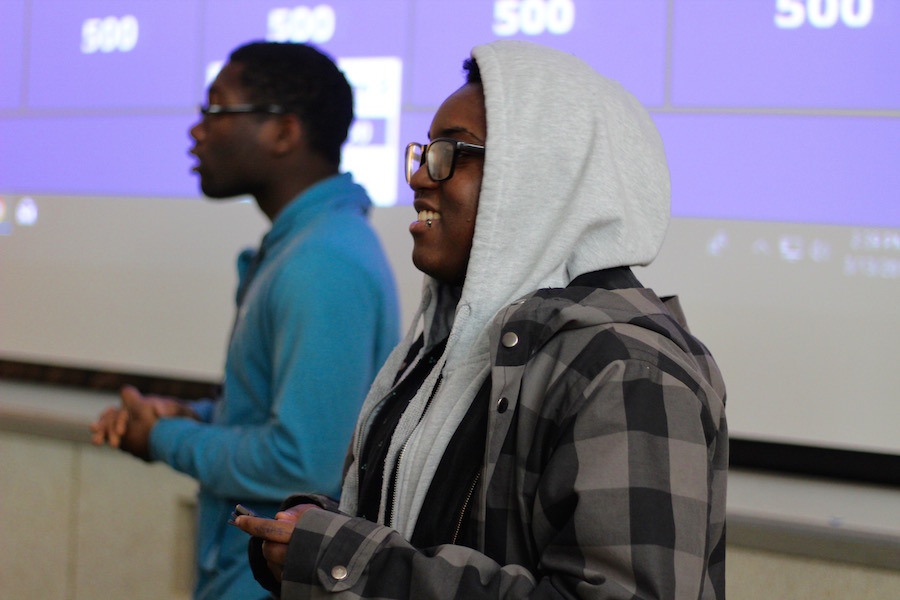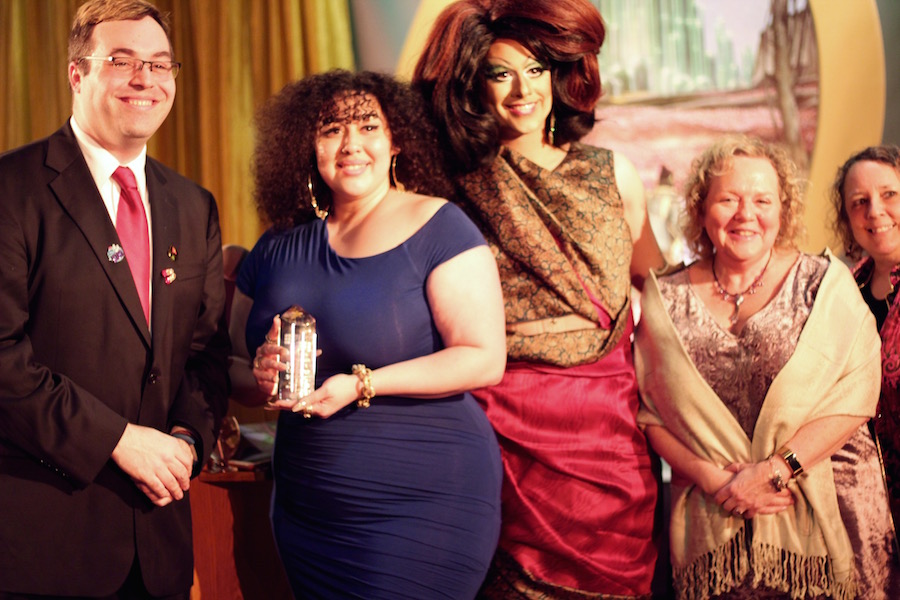
Culture & Community | Education & Youth | LGBTQ

| Lucy Gellman File Photo. |
When Co-Op student Houston Cable came out, he didn’t get the reception he was looking for at home. First his mom “was like, no,” and wouldn’t use his chosen name. Then his sister got tangled up in pronouns. And his dad, who has since warmed to his son, struggled with both. When he handed Cable a Valentine’s Day card addressed “To Houston” months later, it felt like a milestone.
This weekend, Cable will be one of 217 New Haven Public Schools (NHPS) students to tell his story at True Colors’ annual conference, the largest convening of LGBTQ+ youth in the country. From Friday through Saturday, students will lead workshops, meet other LGBTQ+ youth, and take on topics ranging from state non-discrimination policy to an intro to drag from the Imperial Sovereign Court of All Connecticut. And in New Haven, it marks a first: the city is helping them get there.
Financial aid for the conference is just one of several initiatives that New Haven, along with several cities in Connecticut, is rolling out to protect and empower Connecticut's LGBTQ+ youth long after the state has moved to do so. For leaders of that change, that has meant looking at the state’s existing policy, calling schools on their noncompliance, and implementing in-school support systems and staff allies that students can rely on.
In one sense, the shift is long overdue. In 1991, Connecticut passed its first anti-discrimination legislation for LGBTQ+ community members, barring employers, real estate agents, and financial entities from discriminating against people based on their sexual orientation. In 2010 and 2011, the state’s Commission on Human Rights and Opportunities (CHRO) released new guidelines, specifying that schools should abide by a student’s chosen name and pronoun, and provide sensitivity training for staff and faculty.
The state’s Department of Children and Families has also taken up that charge, updating policy language “to ensure fair, equal, and non-discriminatory treatment of all individuals who identify themselves as Lesbian, Gay, Bisexual, Transgender, Questioning, Queer, Intersex, Asexual and Ally (LGBTQQIAA), in accordance with state laws governing non-discrimination.”

| Student Houston Cable is one of 217 high schoolers heading to True Colors this weekend. |
And yet, much of that legislation has not been implemented in public schools around the state. In a 2017 study released by GLSEN, 62 percent of Connecticut’s LGBTQ+ students surveyed reported verbal harassment for their sexual orientation, with 21 percent reporting physical harassment and nine percent reporting physical assault.
Twenty-seven percent reported that teachers, staff, faculty and school administrators refused to use their chosen name or pronouns, while a quarter of educators forbid them from using a locker room that corresponds with their gender identity. Those students are also battling some staggering national data, like the fact that queer youth are 120 percent more likely to experience homelessness than their straight counterparts, according to 2017 data from the University of Chicago.
“LGBTQ+ students face an impression of erasure and straight up bullying in schools,” said Michael Rady, director of expeditions and an LGBTQ+ group leader with the Achievement First charter school network. “This is pretty much across the board … red states, blue states, you name it.”
“If there aren’t any out kids in the school, that’s probably because the school isn’t a safe space,” he added.
Those facts also hit home for New Havener David Weinreb, a bilingual educator and founding member of the city’s LGBTQ+ Youth Task Force. In January 2018, Weinreb started the task force with city Youth Services Director Jason Bartlett, in hopes of making schools safer for LGBTQ+ students who weren’t getting the in-classroom support that they needed. To Weinreb, it didn’t just feel like the right thing to do—it was the right thing to do. As in, the legally correct thing to do.
“When we started, there were state laws that New Haven Public Schools seemed to be not following consistently across all schools,” he said in a recent interview. “We wanted everyone who cared about LGBTQ youth to be at the table."
In its initial stages, the task force focused on broad outreach, looping in not just educators but organizations like Planned Parenthood of Southern New England (PPSNE), Youth Continuum and the New Haven Pride Center (NHPC), where meetings are still held each month.

|
For him, the mission was also personal: he helped found the Gay-Straight Alliance at his own high school in New York, and saw the transformative impact it had on the student body. When the task force was formed last year, one of its first goals was to ensure that there was a Gay-Straight Alliance in every public school.
But that is just the very beginning of the work the task force seeks to do. Ensconced in his City Hall office on a recent Tuesday, Bartlett outlined a four-pronged strategy that the task force has drawn up, zeroing in on safe spaces in schools, the Board of Education itself, public health initiatives, and homelessness and housing.
“It was very apparent to me that in our high schools, there weren’t a lot of safe spaces—nor was there a sensitivity to black and brown LGBT youth,” said Bartlett. “And I felt that that really needed to be addressed.”
In the short term, the Board of Education has risen to the top. Bartlett and Weinreb began pushing for culturally-appropriate policies and GLSEN trainings with physical educators, guidance counselor and school-based health practitioners. Bartlett described himself as particularly excited about a nascent GSA at James Hillhouse High School, which has put up resistance to the idea in the past.
“I want to make sure that we are continuously offering professional development,” he said. “It’s not necessarily that you’re trying to be insensitive, but that you may not actually even know how you may be affecting somebody. So we have to have those conversations.”

| NHPC Board Chair Joshua O'Connell with Roslyn Sotero, Kiki Lucia, StayWell Health Grants Manager Jill Schoenfuss and True Colors, Inc. Founder and Director Robin P. McHaelen. |
Following the interest in public health, they also asked Mayor Toni Harp for testimony supporting proposed Connecticut House Bill 6540, which would allow minors to access HIV prevention methods like Pre-exposure Prophylaxis (PrEP) without the consent of their parents or guardians. She submitted it before a public hearing in late February.
Bartlett said the city is also working to be a better partner with local organizations like the New Haven Pride Center. Last year, the city granted the center $10,000 to hire a part-time program manager for LGBTQ+ youth. This weekend, another $5,000 from the department will help send students from around the city to the True Colors annual conference, the largest LGBT youth conference in the country.
But New Haven is just one piece of a changing, shifting puzzle. Last year, Waterbury-based StayWell Health received a grant that allowed it to hire community organizer and educator Roslyn Sotero, already a grassroots advocate with the city’s Queer Unity Empowerment Support Team (QUEST).
In her new role, Sotero created and launched Waterbury’s first needs assessment for LGBTQ+ youth. Tracking eight categories including the intersection between race and queerness, school culture, queer invisibility and youth homelessness, the assessment provided the first pointed, LGBTQ-specific feedback the city has had on the issue.
“Whoever is going to turn Waterbury over its head is going to be queer folks of color, specifically trans women of color,” she said in early March, while accepting the “Rising Star” title at the Dorothy Awards.
In schools, that message means overcoming both homophobia and transphobia both in the classroom and at home. Working across the state, trans advocate, counselor and educator Tony Ferraiolo has seen a rise in requests for school- and hospital-based trainings for educators, administrators, parents and health practitioners.
Using a “genderbread" person to explain gender identity and sexual orientation, he has offered trainings in Branford, Milford, Madison, Durham, Naugatuck, East Haven and Wethersfield. He said that when he is teaching both parents and teachers, he urges them to get past a mental block on pronouns or gender expression as an exercise in compassion.
“I’m training on kindness!” he said in a recent interview. “I train a lot of health providers about honoring human beings. I tell parents when they don’t like the name that a kid uses, look it up.”
“We need to give them hope for a better life so they won’t take their life,” he said. “They need to be heard, they need to be respected, they need to be honored.”
This article is part of an ongoing collaboration between The Arts Paper and the New Haven Pride Center and also appeared in the Center's monthly print magazine, Centerline. Find out more about Centerline on the New Haven Pride Center's website.

